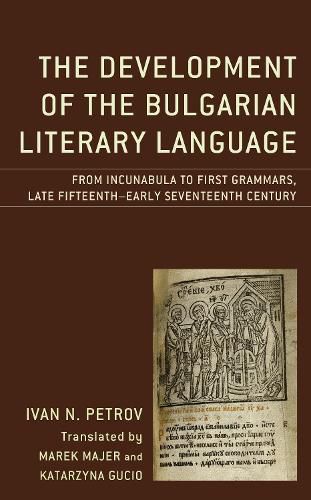Readings Newsletter
Become a Readings Member to make your shopping experience even easier.
Sign in or sign up for free!
You’re not far away from qualifying for FREE standard shipping within Australia
You’ve qualified for FREE standard shipping within Australia
The cart is loading…






Ivan N. Petrov’s The Development of the Bulgarian Literary Language: From Incunabula to First Grammars, Late Fifteenth-Early Seventeenth Century examines the history of the first printed Cyrillic books and their role in the development of the Bulgarian literary language. In the literary culture of the Southern Slavs, especially the Bulgarians, the period that began at the end of the fifteenth century and covered the sixteenth and seventeenth centuries is often seen as a foreshadowing of the pre-national era of modern times. In particular, the centuries-old manuscript tradition was gradually replaced by the Cyrillic printed book, which-after the incunabula of Krakow and Montenegro-was published in such centers as Targoviste, Prague, Venice, Serbian monasteries, Vilnius, Moscow, Zabludow, Lviv, Ostroh, and many others. Petrov shows how the study of old Slavic prints is closely linked to the processes that determined the emergence of modern literary languages in the Slavia Orthodoxa area, including the influence of the liturgical Church Slavonic language shared by the Orthodox Slavs, which was increasingly standardized and codified at that time. The perspective of a language historian brings new light to the complex and multidimensional issues of this important transitional period of Slavic history and culture.
$9.00 standard shipping within Australia
FREE standard shipping within Australia for orders over $100.00
Express & International shipping calculated at checkout
Ivan N. Petrov’s The Development of the Bulgarian Literary Language: From Incunabula to First Grammars, Late Fifteenth-Early Seventeenth Century examines the history of the first printed Cyrillic books and their role in the development of the Bulgarian literary language. In the literary culture of the Southern Slavs, especially the Bulgarians, the period that began at the end of the fifteenth century and covered the sixteenth and seventeenth centuries is often seen as a foreshadowing of the pre-national era of modern times. In particular, the centuries-old manuscript tradition was gradually replaced by the Cyrillic printed book, which-after the incunabula of Krakow and Montenegro-was published in such centers as Targoviste, Prague, Venice, Serbian monasteries, Vilnius, Moscow, Zabludow, Lviv, Ostroh, and many others. Petrov shows how the study of old Slavic prints is closely linked to the processes that determined the emergence of modern literary languages in the Slavia Orthodoxa area, including the influence of the liturgical Church Slavonic language shared by the Orthodox Slavs, which was increasingly standardized and codified at that time. The perspective of a language historian brings new light to the complex and multidimensional issues of this important transitional period of Slavic history and culture.